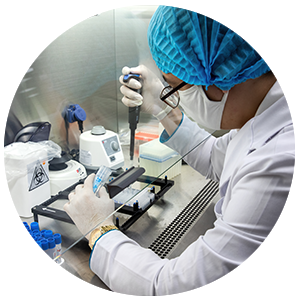Researchers are racing to determine whether a fast-spreading variant in South Africa poses a threat to the effectiveness of COVID vaccines.
Researchers in South Africa are racing to track a worrying rise in a new variant of the coronavirus that causes COVID-19. This variant contains a large number of mutations found in other variants, including Delta, and it appears to be spreading rapidly across South Africa.
.
The first priority is to monitor the variant more closely as it spreads: it was first identified in Botswana this month and has appeared in travelers to Hong Kong from South Africa. Scientists are also trying to understand the variant's properties, such as whether it can evade immune responses triggered by vaccines and whether it causes more or less severe disease. other variations or not.
.
“We are flying at lightning speed,” said Penny Moore, a virologist at the University of the Witwatersrand in Johannesburg. There are anecdotal reports of reinfection and cases in vaccinated people, but “at this stage, it's too early to say anything,” Moore added.
.
“There's a lot we don't understand about this variant,” said Richard Lessells, an infectious diseases physician at the University of KwaZulu-Natal in Durban, South Africa. -Natal in Durban, South Africa, said at a press conference organized by the South African health department on November 25. “The mutation profile concerns us, but now we need to do the job to understand the significance of this variant and its implications for the pandemic response.”
.
A panel of experts from the World Health Organization (WHO) will meet on November 26, and will likely label the strain - currently known as B.1.1.529 - as a variant of concern. or variant of concern, Tulio de Oliveira, a bioinformatician at the University of KwaZulu-Natal, said at the briefing. The variant will likely be named Nu - the next available letter in the Greek naming system for coronavirus variants - if it is flagged by the WHO team.
.
Researchers also want to measure the global spread of the variant, which could spark new waves of infection or worsen ongoing surges fueled by Delta.
.
CHANGE TO INCREASE
Researchers discovered B.1.1.529 in genome sequencing data from Botswana. This variant stands out because it contains more than 30 changes to the spike protein - the SARS-CoV-2 protein that recognizes host cells and is the main target of the body's immune responses. Many changes have been found in variants such as Delta and Alpha and are associated with greater infectivity and the ability to evade antibodies that block infection.
.
But the apparent rise of this variant in South Africa's Gauteng province - home to Johannesburg - is also raising alarm bells, according to Lessells. Genome sequencing and other genetic analysis from de Oliveria's team found that the B.1.1.529 variant was responsible for all 77 virus samples they analyzed from Gauteng, collected between December 12 and 20. November 20. Analysis of hundreds more samples is underway.
.
The variant contains a spike mutation that allows it to be detected by genotyping tests that provide results much faster than genome sequencing, Lessells said. Preliminary evidence from these tests suggests that B.1.1.529 has spread significantly further than Gauteng. “It makes us concerned that this variant may have been circulating quite widely in the country,” Lessells said.
.
THE EFFECTIVENESS OF VACCINE
To understand the threat that B.1.1.529 poses, researchers will closely monitor its spread in South Africa and beyond. Researchers in South Africa have mobilized an effort to quickly study the Beta variant, identified there in late 2020, and a similar effort is starting to study B.1.1.529.
.
Moore's team - which provided some of the first data on Beta's ability to evade immunity - began work on B.1.1.529. They plan to test the virus's ability to evade antibodies that block infection, as well as other immune responses. The variant contains multiple mutations in regions of the spike protein that antibodies recognize, potentially reducing their potency. “Many of the mutations we know are problematic, but many others look like they are contributing to further evasion,” Moore said. Moore said there are even suggestions from computer modeling that B.1.1.529 may be able to evade immunity generated by another component of the immune system called T cells. The team Her first results are expected in two weeks.
.
“A burning question is “will it reduce the effectiveness of the vaccine, because it has so many changes?”. Moore said breakthrough infections have been reported in South Africa in people who received any of the three vaccines being used there, from Johnson & Johnson, Pfizer – BioNTech and Oxford – AstraZeneca. Two travelers quarantined in Hong Kong who tested positive for the variant have been vaccinated with the Pfizer vaccine, according to news reports. One individual had traveled from South Africa; The remaining person was infected during hotel quarantine.
.
Researchers in South Africa will also study whether B.1.1.529 causes more or less severe disease than other variants do, Lessells said. "The really important question is around the severity of the disease."
.
So far, the threat B.1.1.529 poses outside of South Africa remains unclear, researchers say. Moore said it is also unclear whether this variant is more transmissible than Delta, as the number of COVID-19 cases in South Africa is currently very low. “We are in a lull,” she said. Katzourakis said that countries where Delta is highly prevalent should watch for signs of B.1.1.529. “We need to see what effect this virus has on competitive success and whether it increases in popularity.”
.
Translator: Ho Thuy Tien – Phacogen Institute of Technology,
Bachelor of Biology Education - English





